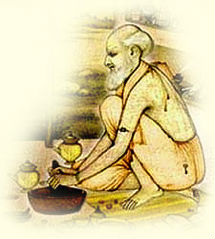

Ayurveda is a monumental contribution of India to the world. As the name implies, Ayurveda (ayuh : life, veda : knowledge) is an organized body of knowledge of healthy living. Systematized knowledge is science, and it is an expression of human creativity. Since creativity has diverse expressions science is a multifaceted enterprise, which refers to different ways of knowing. So the term science need not be confined to the sense of the term used in modern western culture, where it is an institutionalized practice conditioned by a set of conventional rules. This realization about the vast conceptual framework of science is mandatory for the appraisal of Ayurveda, which represents a well-codified human care system and speaks of the art and science of health and healing.
From where and when the stream of Ayurveda started flowing still remains
unanswered. However, it has an uninterrupted history of more than 3000 year.
It could be seen that Ayurveda is rooted in the knowledge revealed by ancient seers whose insights and visions are compiled in thevedas. Vedas are the earliest forms of documented knowledge. The six systems of Indian philosophy - nyaya, vaiseshika, sankhya, yoga, mimamsa and vendanta acknowledged the authority of vedas. Of the four vedas, Atharvaveda contain more intimate reference to medical knowledge and practice. Ayurveda is therefore considered as an auxiliary limb (upaveda) of Atharvaveda. Similarly, the influence of classical Indian Philosophies, especially of sankhya and vaiseshika is apparent in ayurvedic literature. These philosophical moorings make Ayurveda more than a medical manual though it is radically health oriented.
Ayurveda is more concerned with function and dysfunction of the human body, the orderly up keep of which is the prime requisite to fulfill the human aspirations and to achieve the ultimate goals of life. Ayurveda can thus be introduced as a system of medicine built on philosophical foundation that does not go on changing over time. Ayurveda, as any other biological discipline, is dynamic at operational level. Obviously the super structure of Ayurveda is flexible and flexible enough for appropriate extrapolation. This unique feature makes the art of healing down to earth practical in tune with the changing trends and needs of the human life.
Ayurveda is based on the principle that purusha, the individual being, is a blend of soul, mind, sense organs and body. The structural and functional units of the human body are categorized and represented in Ayurveda in terms of bio chemical energies of the living body(doshas), tissues (dhatus) and metabolic end products (malas).
Health is defined as a state wherein the dynamic balance of doshas, dhatus and malas is maintained, the metabolism is at optimum level and soul, mind and sense organs assume sublime position. This definition fully agrees with the integral vision of health envisaged by WHO; the former has an additional dimension of sound spirituality.
The structural and functional units of human body are composed of five basic elements known as panchabhutas. Panchabhutas literally mean the five elements, which include the earth, the water, the fire, the wind and the space. Each one of them wields an influence on certain part of the human constitution. For example, every opening in the body, the ears and the voids and internal sounds of the body are all belonging to the element of space. The element of fire influences the human form and its glow, the eyes, the bodily heat, the digestive activity and also the feelings of anger and valour. Recognition of this identical elemental basis of human body and outside world has profound implications in the practice of medicine.
The conceptual and operational framework of Ayurveda is wide enough to include all that is essential to make a man healthy and happy. It includes the study of right conduct (dharma), which is necessary for the healthy growth of society in which the man lives. Further it deals with the philosophical aspect of life, the knowledge of which contributes greatly to the comfort and happiness of all human beings. Ayurveda philosophically understands the limitation of human efforts. Still it talks about the means of prolonging life and the methods of invigorating it.
In short, Ayurveda has a unique self-designed axiomatic framework as its foundation, which remarkably holds out a truly global vision. It assumes fundamental continuity between all elements of universe and as a natural extension of this ideology perceives man as an integral part of nature. Ayurveda underscores the fundamental commonalties observed in man and nature and attempts to explain the human life in its totality.
Diseases are the manifestations of perturbations in the equilibrium of body constituents –the doshas, dhatus and malas. Perturbation involves the increase or decrease of body constituent as the case may be.
According to Ayurveda, medicine is that which being well administered becomes an equalizer of increased or diminished elements, which brings down the excessive one and augments the deficient one thus restoring the pre-morbid condition of the body. This concept leads to the realization that there is nothing in the world, which cannot be used as medicament.
Ayurveda considers him as the best physician who knows the science of administration of drugs with due reference to climate, and who applies it only after examining each and every patient individually. To acquire this proficiency and competency, a comprehensive knowledge of human anatomy and physiology, disease process, medical and surgical management, psychiatry, preventive medicine, medical ethics, materia medica and pharmacology is indispensable. The content of Ayurveda embraces all the spheres separately, but emphasizing on a holistic vision.
“LIFE IS NOT JUST LIVING, BUT LIVING WITH GOOD HEALTH”-
“Dharmaarthakaamamokshaanaam aarogyam moolamuttamam”
Address
Dhanwantari Nagar, CN Puram (PO)
Palakkad, Kerala - 678005
Telephone: +91-491-2577791 / +91-491-2577971
devikripa.ayurvedahospital@gmail.com
Website designed and maintained by 72-pixels.com


